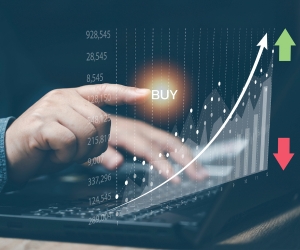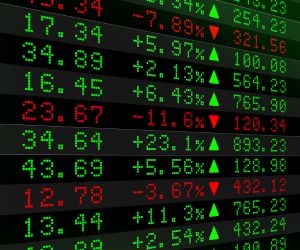Boeing is a leading company in the aerospace industry, known for its commercial airplanes, defense products, and space systems. It is listed on the New York Stock Exchange (NYSE), a crucial market for significant industrial companies. So, is it a good investment? Are there ups and downs? What investment strategy should I use with this stock? This article will answer these questions and more.

Steps to Invest in Boeing (BA)
Research and Analysis:
Boeing is one of the leading manufacturers of commercial and defense aircraft globally. Its shares trade on the New York Stock Exchange (NYSE) under the ticker BA. Before investing, analyze its financial reports, order backlog, production capacity, and position compared to its main competitor, Airbus (AIR). Also, review its exposure to government contracts, regulatory issues, production costs, and technological advancements in the aerospace sector.Opening an Investment Account:
To purchase Boeing shares, you need to open an account with a brokerage firm that operates on the NYSE. It is advisable to evaluate commissions, analysis tools, and market access ease before choosing a broker. Typically, you'll be asked for a copy of your identification and a utility bill (e.g., electricity or water bill) to verify your identity and address. Compare the commissions, trading platforms, and services offered by each brokerage to choose the one that best suits your needs.Define Investment Strategy:
Boeing is a cyclical company, influenced by the demand for commercial aircraft and defense spending. In the long term, the recovery of the aviation sector and the need for fleet renewal can drive its growth. For the short term, its volatility can be leveraged in trading strategies, especially with announcements of new orders, financial results, and changes in aviation safety regulations.Execution and Monitoring:
Once you have acquired BA shares, closely follow its quarterly reports, the performance of its defense segment, and the development of key models like the 737 MAX, 787 Dreamliner, and 777X. Also monitor external factors such as material costs, delivery delays, and regulations from the Federal Aviation Administration (FAA).Portfolio Diversification:
Boeing is a company with industrial and cyclical risks. To reduce exposure, you can diversify with other sectors, such as technology (Nvidia, Microsoft) or consumer goods (Coca-Cola, McDonald's). You may also consider aerospace and defense sector ETFs, such as the iShares U.S. Aerospace & Defense ETF (ITA).
SWOT Analysis of Boeing as an Investment
We will use a SWOT analysis to evaluate investment in Boeing, comprehensively examining internal and external factors influencing the company's performance in the aerospace and defense sector.
Strengths:
Global leadership: Boeing is one of the leading manufacturers of aircraft and defense systems, with a globally recognized brand.
Diversified portfolio: Its offerings include commercial aircraft, defense systems, satellites, and aftermarket services, allowing it to diversify its revenue streams.
Long-term contracts: It holds significant contracts with airlines and governments that ensure stable income flows.
Technological innovation: Investment in R&D supports the continuous improvement of its products and processes.
Weaknesses:
Safety and quality issues: Recent incidents and delays in key programs have affected the reputation and trust in some of its models.
High operational costs: Aircraft production requires significant investments, which can pressure margins in adverse economic cycles.
Supply chain dependency: Logistic complexity and reliance on global suppliers can lead to disruptions and delays.
Opportunities:
Growth in aviation demand: Fleet modernization and increased air travel in emerging markets offer growth potential.
Innovation in sustainable technology: Developing more efficient aircraft with lower fuel consumption can capture new segments and enhance competitiveness.
International expansion: Geographic diversification in rapidly growing markets can reduce dependency on specific regions.
Threats:
Intense competition: Airbus and other global competitors pose a threat in terms of innovation and pricing.
Demand fluctuations: Economic crises and changes in consumer behavior can impact the demand for new aircraft.
Geopolitical risks: International conflicts and political tensions can affect contracts and global market stability.
What is an International Stock Broker?
An International Stock Broker is the entity (or platform) that allows you to buy and sell shares of companies listed on stock exchanges in different countries around the world. Unlike a local broker, the main focus of International Brokers is to offer access to global markets, such as the US, European, or Asian markets.
Why do we need an International Stock Broker?
Investing in international stocks can be an excellent way to diversify your portfolio, as it gives you the opportunity to participate in the growth of economies and sectors worldwide. However, operating in global markets is not as simple as in the local market: specific knowledge is required, compliance with international regulations, and the use of advanced trading platforms.
An International Stock Broker brings together all these investment opportunities in one place and allows you to access different exchanges and trading conditions, in exchange for a commission.
Examples and comparisons:
There are several well-known International Stock Brokers, such as Interactive Brokers, eToro, TD Ameritrade, or Saxo Bank, among others. Each offers trading platforms with particular features and varying commissions depending on the service. Some excel at providing market advice and analysis in multiple languages, while others may offer more competitive operating costs or social investment tools. These details allow you to choose the option that best suits your needs and investor profile.
Regulatory and security aspects
It is crucial that the International Stock Broker you choose is regulated by recognized entities in the country where it operates, such as the U.S. Securities and Exchange Commission (SEC) in the United States, the Financial Conduct Authority (FCA) in the United Kingdom, or the Securities Commission (CVM) in Brazil, among others. This supervision ensures that the broker complies with strict security and transparency standards, providing you with greater confidence when investing your money.
How do Brokers “connect” to International Markets?
Through agreements with foreign stock exchanges and the use of advanced technological platforms, International Stock Brokers process the buy and sell orders placed by their clients. They order transactions according to price, order of arrival, and other parameters, charging a commission when the operation is executed. This technological infrastructure allows operations to be carried out quickly and securely, facilitating real-time tracking of your investments.
In conclusion, an International Stock Broker is your gateway to the world's most important stock markets. Thanks to its regulation, trading platforms, and knowledge of global markets, you can diversify your portfolio and seek growth opportunities in different sectors and countries.





